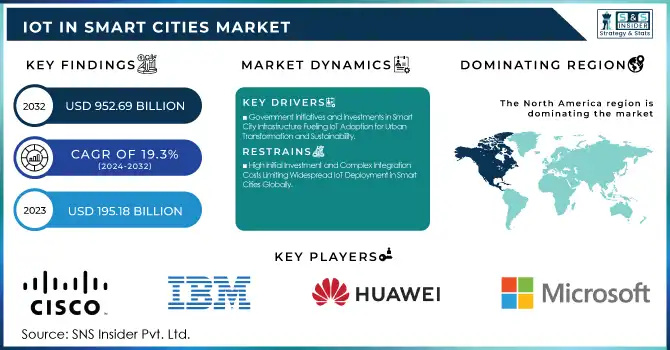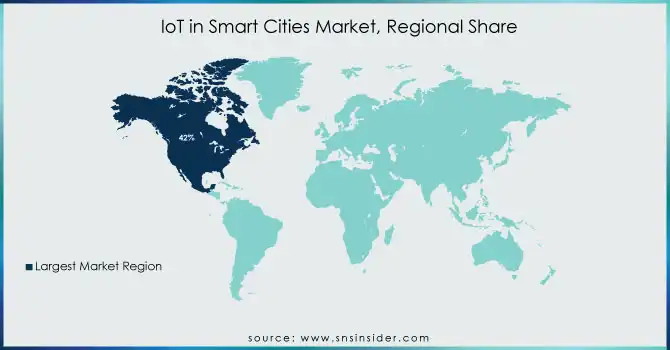IoT in Smart Cities Market Size & Trends:
The IoT in Smart Cities Market Size was valued at USD 195.18 Billion in 2023 and is expected to reach USD 952.69 Billion by 2032 and grow at a CAGR of 19.3% over the forecast period 2024-2032.

To get more information on IoT in Smart Cities Market - Request Free Sample Report
The market includes adoption rates, technology trends, investment patterns, and government initiatives. Data on infrastructure development, smart city projects, and partnerships between tech companies and municipalities can offer insights into market dynamics. Furthermore, the penetration of IoT in various sectors such as transportation, energy, healthcare, and public safety can be highlighted. Additionally, consumer behavior, sustainability initiatives, and security concerns related to IoT can provide a comprehensive overview of market opportunities and challenges.
IoT in Smart Cities Market Dynamics
Key Drivers:
-
Government Initiatives and Investments in Smart City Infrastructure Fueling IoT Adoption for Urban Transformation and Sustainability
Government initiatives and investments in smart city infrastructure have significantly driven the adoption of IoT technologies in urban settings. As cities worldwide seek to become more sustainable, efficient, and technologically advanced, governments are increasingly funding smart city projects to improve urban living. By promoting investments in IoT technologies, governments facilitate the growth of urban environments, offering solutions that enable more informed decision-making for city management. For instance, through intelligent traffic management systems, optimized public transportation networks, and energy-efficient systems, governments are helping to reduce environmental impacts while improving the quality of life. As this trend continues, the IoT in smart cities market is expected to see sustained growth, as public and private sector investments align to foster further IoT integration.
Restraint:
-
High Initial Investment and Complex Integration Costs Limiting Widespread IoT Deployment in Smart Cities Globally
Despite the promising potential of IoT in transforming smart cities, the high initial investment and integration costs serve as significant barriers. Deploying IoT infrastructure requires considerable upfront capital, particularly in terms of purchasing devices, sensors, communication networks, and other hardware components. These financial and technical barriers create resistance from governments and businesses, particularly in cities with limited budgets or a lack of technical expertise. Until solutions emerge that reduce the cost of IoT adoption and simplify integration, these financial constraints will continue to hamper the broader and faster adoption of IoT technologies across smart cities, slowing market expansion in certain regions.
Opportunity:
-
Growing Trend of Urbanization Creating Opportunities for IoT Solutions to Enhance Quality of Life and Urban Services
The rapid pace of urbanization presents a significant opportunity for the IoT in smart cities market, as cities seek innovative ways to accommodate growing populations and address emerging urban challenges. As urban areas expand, the demand for efficient transportation, waste management, water supply, and healthcare services rise, creating a substantial need for IoT-enabled solutions.
Additionally, IoT-enabled public health monitoring systems can ensure faster and more accurate responses to health crises. As urbanization accelerates globally, the integration of IoT systems offers an unprecedented opportunity to enhance the quality of life in cities, creating more sustainable and efficient urban environments. This growing need for urban transformation represents a valuable opportunity for both IoT providers and municipalities looking to modernize their infrastructure.
Challenge:
-
Data Security and Privacy Concerns Impeding Widespread Trust and Adoption of IoT Technologies in Smart Cities
One of the major challenges faced by the IoT in smart cities market is the issue of data security and privacy. As IoT devices collect and transmit vast amounts of data in real-time, they create vulnerabilities that can be exploited by cybercriminals. Sensitive information such as personal data, public infrastructure status, and transportation patterns is at risk of being intercepted, leading to potential misuse or breaches.
Additionally, the complexity of managing large volumes of data, ensuring its protection, and complying with privacy regulations creates significant challenges for municipalities. The lack of standardized security protocols across IoT devices only adds to the complexity. Overcoming these security and privacy challenges is essential for fostering widespread trust and ensuring the continued growth of IoT technologies in smart cities.
IoT in Smart Cities Market Segmentation Analysis
By Offering
In 2023, the Solutions segment accounted for the largest revenue share of 64%, driven by increasing investments in smart city infrastructure and advancements in technology. Companies like Cisco, Siemens, and Huawei have been leading the way in launching innovative solutions tailored for smart cities, including IoT-based smart traffic management, energy-efficient buildings, and public safety systems. Cisco's Digital Network Architecture and Siemens’ Smart Infrastructure solutions are prime examples of such developments, enabling cities to manage resources efficiently, enhance connectivity, and improve quality of life.
The Services segment is projected to grow at the highest CAGR of 20.29% during the forecast period, indicating an increasing reliance on services such as cloud computing, data analytics, and network management. Companies like IBM and Accenture have been focusing on delivering these services through strategic partnerships and cloud solutions tailored to smart cities. The expansion of IoT in smart cities relies heavily on services like data processing and analytics to turn raw data into actionable insights.
By Application
In 2023, the Smart Transportation segment led the market with the largest revenue share of 33%, reflecting the growing demand for connected transportation solutions that improve urban mobility and reduce congestion. Companies like Uber, Tesla, and Siemens have made significant strides in this sector, with innovations in autonomous vehicles, traffic management, and electric mobility.
Additionally, Siemens’ smart traffic management solutions, such as adaptive traffic signals and predictive analytics, enable cities to optimize traffic flow and reduce emissions. IoT plays a central role in the Smart Transportation sector by providing real-time data from sensors embedded in vehicles and infrastructure, enabling systems to communicate, respond dynamically to traffic conditions, and improve overall traffic safety.
the Smart Building segment is expected to grow at the highest CAGR of 21.36% during the forecast period. This growth is driven by the increasing demand for energy-efficient buildings, automation, and sustainability. Companies like Honeywell, Johnson Controls, and Schneider Electric are at the forefront of developing smart building solutions, including intelligent HVAC systems, lighting controls, and energy management systems. These innovations leverage IoT technology to monitor and control building environments, ensuring energy savings, improved comfort, and reduced operational costs.
IoT in Smart Cities Market Regional Outlook
In 2023, North America dominated the IoT in Smart Cities Market, accounting for the largest market share. The region is estimated to hold around 42% of the global market share. This dominance can be attributed to the significant investments in smart city projects, strong governmental support, and the presence of key technology companies driving innovation in IoT solutions.
For instance, the U.S. government’s commitment to smart infrastructure and sustainability, through initiatives like the Smart Cities Challenge, has encouraged cities such as New York and San Francisco to implement IoT-based solutions in areas like traffic management, energy efficiency, and public safety.
Asia Pacific is the fastest-growing region in the IoT in Smart Cities Market in 2023, with an estimated CAGR of around 21.51%. This rapid growth is fueled by rapid urbanization, government initiatives, and the adoption of advanced technologies in countries like China, India, and Japan.
For example, China's Smart Cities initiative and India’s "Smart Cities Mission" are major drivers of IoT adoption, focusing on improving urban living through intelligent transportation, waste management, and smart energy solutions.

Get Customized Report as per Your Business Requirement - Enquiry Now
Key Players
Some of the major players in the IoT in Smart Cities Market are:
-
Cisco Systems Inc (Cisco Kinetic for Cities, Cisco Connected Traffic Solutions)
-
IBM Corporation (IBM Watson IoT for Smart Cities, IBM Maximo)
-
Huawei Technologies Co. Ltd (Huawei Smart City Solution, Huawei OceanConnect IoT Platform)
-
Intel Corporation (Intel IoT Platform, Intel IoT Gateway)
-
Microsoft Corporation (Azure IoT, Azure Digital Twins)
-
Robert Bosch GmbH (Bosch IoT Suite, Bosch Smart City Mobility)
-
PTC (ThingWorx, Vuforia)
-
Siemens AG (Siemens City Performance Tool, Siemens Smart Infrastructure)
-
Verizon Communications (Verizon Smart Communities, Verizon Thingspace)
-
Honeywell International Inc. (Honeywell Smart Building Solutions, Honeywell Connected Services)
-
Hitachi Ltd. (Hitachi Smart City Solutions, Hitachi Visualization Suite)
-
Arm Ltd (Arm Mbed IoT Device Platform, Arm Pelion IoT Platform)
-
Schneider Electric (EcoStruxure Smart Cities, EcoStruxure IoT Platform)
-
Sierra Wireless (AirVantage IoT Platform, Smart City Solutions)
-
Quantela (Smart City Platform, Quantela City Cloud)
-
Youon Technology Co., Ltd. (Youon Smart Parking System, Youon Intelligent Transport System)
-
SAP SE (SAP Leonardo IoT, SAP Smart City Solutions)
-
Deutsche Telekom AG (T-Labs Smart City Solutions, Deutsche Telekom IoT Platform)
-
Confidex Ltd. (Confidex IoT Tags, Confidex Smart City Solutions)
-
AGT Group GmbH (AGT Smart City Platform, AGT Smart Parking)
Recent Trends
-
January 2025: IBM discussed how modern enterprises are leveraging IoT data for innovation. They highlighted the benefits of edge computing, enabling real-time data processing close to IoT devices. This reduces latency and bandwidth issues. Applications span across industries, from agriculture and industrial operations to healthcare and security, driving smarter decisions and enhancing customer experiences.
-
March 2024: Unilumin, in partnership with Huawei, unveiled their Smart Pole Site Joint Solution at MWC 2024. This solution aims to accelerate smart city transformations by offering secure, sustainable, intelligent, and efficient city operations. The system integrates advanced technologies such as 5G, ultra-high-resolution visualization, and smart poles to optimize urban governance.
| Report Attributes | Details |
|---|---|
| Market Size in 2023 | USD 195.18 Billion |
| Market Size by 2032 | USD 952.69 Billion |
| CAGR | CAGR of 19.3% From 2024 to 2032 |
| Base Year | 2023 |
| Forecast Period | 2024-2032 |
| Historical Data | 2020-2022 |
| Report Scope & Coverage | Market Size, Segments Analysis, Competitive Landscape, Regional Analysis, DROC & SWOT Analysis, Forecast Outlook |
| Key Segments | • By Offering (Solutions [Remote Monitoring, Real-time Location System, Data Management, Reporting and analytics, Security, Network Management] Services (Professional Services [Consulting, System Integration and Deployment, Support and Maintenance] Managed Services) • By Application (Smart Transportation, Smart Building, Smart Utilities, Smart Citizen Services [Education, Healthcare, Public Safety]) |
| Regional Analysis/Coverage | North America (US, Canada, Mexico), Europe (Eastern Europe [Poland, Romania, Hungary, Turkey, Rest of Eastern Europe] Western Europe] Germany, France, UK, Italy, Spain, Netherlands, Switzerland, Austria, Rest of Western Europe]), Asia Pacific (China, India, Japan, South Korea, Vietnam, Singapore, Australia, Rest of Asia Pacific), Middle East & Africa (Middle East [UAE, Egypt, Saudi Arabia, Qatar, Rest of Middle East], Africa [Nigeria, South Africa, Rest of Africa], Latin America (Brazil, Argentina, Colombia, Rest of Latin America) |
| Company Profiles | Cisco Systems Inc, IBM Corporation, Huawei Technologies Co. Ltd, Intel Corporation, Microsoft Corporation, Robert Bosch GmbH, PTC, Siemens AG, Verizon Communications, Honeywell International Inc., Hitachi Ltd., Arm Ltd, Schneider Electric, Sierra Wireless, Quantela, Youon Technology Co., Ltd., SAP SE, Deutsche Telekom AG, Confidex Ltd., AGT Group GmbH. |

